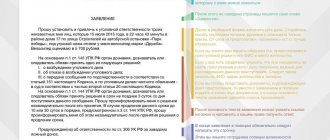A police report is a way for any citizen to report a crime and regain or protect their rights and sometimes their safety. A statement, including a statement of theft, is an official document. Its filing is a legally significant action that entails consequences not only for law enforcement agencies and the person against whom it was filed, but also for the applicant himself. Is it possible to withdraw a statement from the police after it has been filed about theft, and how to withdraw a statement from the police about theft, you need to know in advance.
○ Grounds for withdrawal of application
It would be correct to talk not about withdrawing a previously submitted application, but about filing a new one, with the aim of canceling the previous one. According to Article 140 of the Code of Civil Procedure of the Russian Federation , a statement is a reason to initiate a criminal case. In accordance with Article 141 of the Code of Civil Procedure :
1. A statement about a crime can be made orally or in writing.
2. The written statement of the crime must be signed by the applicant.
3. An oral statement about a crime is entered into the protocol, which is signed by the applicant and the person who accepted this statement. The protocol must contain information about the applicant, as well as documents identifying the applicant.
4. If an oral report of a crime is made during an investigative action or during a trial, then it is entered, respectively, in the protocol of the investigative action or the protocol of the court session.
5. In the event that the applicant cannot be personally present when the protocol is drawn up, his application is drawn up in the manner established by Article 143 of this Code.
6. The applicant is warned of criminal liability for knowingly false denunciation in accordance with Article 306 of the Criminal Code of the Russian Federation, about which a note is made in the protocol, which is certified by the applicant’s signature.”
Each application goes through the prescribed registration procedure. Therefore, it is impossible to go and say that I want to take my application back.
If it is registered, the information contained in it must be verified and a decision will be made on it:
- On the initiation of a criminal case.
- Refusal to initiate a case.
Thus, in terms of withdrawing an application, one should only say that it is possible to submit a new application, in which a request is made not to initiate proceedings on the original application. And this could happen in the following cases:
- If reconciliation has been reached with the person in respect of whom the question of bringing him to justice was raised.
- If it turns out that the person who was accused of committing an offense is not guilty or the event of the offense itself did not occur.
✔ The guilty person made amends
The law allows the termination of a criminal case or refusal to initiate it if, by the time the decision is made, the applicant and the guilty person have reached reconciliation:
- An apology was made.
- The damage caused has been compensated.
However, in order for the second statement of the absence of claims made in the primary document to be taken into account, the following conditions are necessary:
- The crime committed is classified as minor or moderate.
- The person held accountable agrees to the termination of his criminal prosecution.
The decision on the case is made by the investigator or inquiry officer. The law gives them the right to make any decision within the framework of the law.
However, this does not mean that filing a second application, which is aimed at canceling the first, obliges investigators or the inquiry officer to make just such a decision.
As judicial practice shows, usually all initiated cases are sent to court, and the court decides on the release of the perpetrator from liability at the request of the victim.
✔ There was no criminal attack
The second basis for releasing the person against whom the application was made from liability is confirmation of the absence of a criminal offense. This question may trigger:
- Applicant.
- The person against whom the complaint was made.
- Eyewitnesses.
- Police officers.
In this case, if a criminal case has not yet been initiated, a decision is made to refuse to initiate it. And if it has already been initiated, then a decision to terminate the criminal case.
For example, the owner of a car reported it stolen. After some time, it turned out that the car was parked incorrectly, and therefore was evacuated to the impound area. That is, there is no fact of theft as a basis for initiating a criminal case, and the instituted one – for its termination.
At the same time, each applicant must remember that when submitting a written or oral application, he is warned of criminal liability under Art. 306 of the Criminal Code for knowingly false denunciation. And if the fact of deception of law enforcement agencies on the part of the applicant is established, then the status of the victim can be changed to the accused.
Possible consequences
Taking an application back is actually more difficult than it might seem. It is important to remember that deceiving the police is punishable by law. A rash appeal to law enforcement agencies may result in criminal liability for providing false information.
Before you complain to the police, you need to make sure that a crime has occurred. If there is still a need to withdraw the complaint, you must immediately send a request and competently justify the reasons. Otherwise, adverse consequences cannot be avoided.
If you find yourself in a difficult situation and want to withdraw your submitted application, but are afraid of the consequences, contact our lawyers for advice. They will advise how to get out of the situation with the least losses.
○Refusal of an application in the absence of a crime
Refusal of a previously submitted application is also formalized by an application drawn up on behalf of the same person. There is no prescribed form for writing such a document. Therefore, it can be drawn up in any form, but must be in writing.
At the same time, law enforcement officials will be forced to clarify whether the initial statement was slander.
✔ Rules for drawing up a refusal application
When filing an application for dismissal of previously brought charges, the following requirements must be met:
- The document is drawn up in the name of the head of the police, if the materials are being processed by the investigative body, or in the name of a specific investigator who is in charge of the criminal case.
- The applicant's full personal data, address of his place of residence, means of contacting him, in the form of a telephone number or email address, are indicated;
- The narrative must indicate when and why the original application was submitted.
- Then state the reasons why the second application is being filed (the parties have been reconciled, the damage caused has been compensated, it has turned out that the person in respect of whom the initial application was filed has nothing to do with the incident or the event that occurred cannot be regarded as an offense).
- Make a reference to the legal grounds for such an appeal (Article 25 of the Code of Criminal Procedure, Parts 2 and 3 of Article 20, Article 25 of the Code of Criminal Procedure).
Accordingly, the document must have the date of its preparation, signature, surname and initials of the applicant.
✔ Submitting a new application
If the initial application has lost all meaning for the applicant or the issue has been resolved in a different way, filing a new application is mandatory. This will allow you to make a correct and informed decision on the initial document.
✔ Sample application for refusal
The following document can serve as a sample:
Source: businessman.ru
○ Registration of refusal of an application based on reconciliation of the parties
Current legislation, namely Art. 25 Code of Criminal Procedure and Art. 76 of the Criminal Code of the Russian Federation , as a reconciliation of the parties, provide for the achievement of a peace agreement between the two parties, represented by the victim and the accused.
It consists of the demands of the victim, the fulfillment of which by the accused may lead to the termination of criminal or other prosecution of the perpetrator, who, in turn, agrees to fulfill the demands of the victim.
It is impossible to simply go to the police and withdraw a statement. There is only one way out - to file an application for reconciliation of the parties. However, such a step is possible in relation to an initiated criminal, civil or administrative case only until the judge makes his verdict on a specific case.
The result will be the consequences specified in Part 2 of Art. 86 CC :
“A person released from punishment is considered to have no criminal record.”
✔ When criminal prosecution is not necessary
Based on the meaning of the requirements set out in Article 76 of the Criminal Code of the Russian Federation, exemption from criminal liability on the basis of reconciliation of the parties is possible provided:
- The deed committed is of little gravity.
- The act was committed by the perpetrator for the first time.
- Correction of the perpetrator is possible without the use of criminal penalties.
- Making amends for the harm caused.
- Reconciliation with the victim.
That is, the victim is not interested in further intervention of the authorized bodies in the conduct of the proceedings.
✔ Refusal during pre-investigation check
After a complaint is received by the police, a pre-investigation check is ordered. The law allows for this from 3 to 10 days. In certain cases this period may be extended. During this time, no decision on the merits of the application has yet been made.
And if at this time there is a repeated statement that there is no need to make a decision on the initial application, then a refusal document will be issued, and the parties will be offered to resolve their conflict in a civil manner.
✔ Reconciliation of the parties
The parties to the conflict can reach a settlement agreement at any stage of the proceedings:
- Pre-investigation check.
- Stage of inquiry and preliminary investigation.
- Trial.
The main condition is that no final decision should be made on the case.
Causes
The most popular reasons and circumstances why an applicant may wish to withdraw his application:
- Lack of corpus delicti. The parties enter into a conflict that results in minor use of physical force or exclusively verbal abuse. Being in an emotionally unstable state, one of the participants in the conflict contacts the police with a complaint.
As time passes, he realizes that he has committed a rash act that could entail serious legal consequences for the other party, and decides to cancel his complaint.Art. 24 of the Code of Criminal Procedure determines that a criminal case is not initiated, and the initiated case is terminated in the absence of corpus delicti.
- Reconciliation of the parties. The citizen who asked for help has no significant claims against the offender. All existing disagreements are ultimately resolved by the parties peacefully. This implies the conclusion of an agreement, according to which the guilty party compensates the injured party for the harm caused to her in full.
- The victim is under pressure. A citizen can cancel a complaint under pressure from the guilty party.
Thus, the offender can force the victim to withdraw the complaint from the police under the threat of destruction or damage to property, or the use of violence against the victim herself or her family members. A death threat is also possible. In such cases, the guilty person may be assigned a preventive measure not only under Art. 116 of the Criminal Code (beatings), but also under Art. 309 of the Criminal Code (coercion to evade testifying). - The accusation of battery is slander . Such a circumstance, in which a citizen is falsely accused of assault, becomes the basis for initiating a criminal case against the applicant himself under Art. 128.1 of the Criminal Code (slander).
○ Conditions for refusing an application
The initiative to waive the initially stated requirements can only come from the person who filed the initial application. The reasons for such a decision may be different and depend on the subjective perception of the applicant’s real life.
However, the law can accommodate such changed behavior of the applicant only under strict compliance with certain conditions:
- There are no serious consequences for the victim.
- The crime is considered to be a crime of minor and medium gravity.
- The parties to the conflict agree to a peaceful resolution of the incident.
- The offense was committed by a person for the first time.
- The person who violated the law compensated the victim for the material and moral damage caused, or has a notarization of such an action.
When the action is irreversible
The application itself cannot be taken back. Police officers do not have the opportunity to give it back or destroy it. But the victim still has the right to refuse the application. Then the police will conduct an investigation and decide whether to initiate criminal proceedings.
In some situations this is not possible:
- if the actions of the guilty person are qualified under Article 112 of the Criminal Code of the Russian Federation (causing harm to health of moderate severity);
- if, on the basis of the victim’s complaint, Article 111 of the Criminal Code of the Russian Federation (severe harm) is qualified;
- if a long time has passed since the filing and a criminal case has already been initiated.
The decision to transfer the proceedings to court or to close it will be made by the police and prosecutors.







